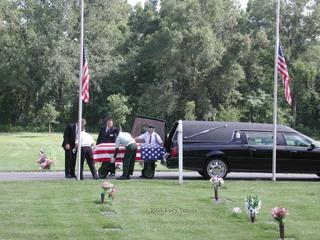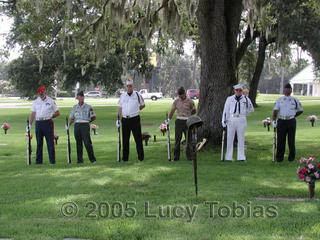Wayne Geer died alone. A U. S. Army veteran who served a tour of duty in Korea, Geer had no fixed address. He was living in a Belleview, Florida hotel room and was found by the motel owner lying in a small pool of blood. It looked like he hit his head.
Geer had been drinking. Not unusual for the veteran who was often seen around town – a man with a white beard riding his bicycle – but he had quit alcohol, gone on the wagon involuntarily for a while because he was out of work and had no money to buy liquor. The motel owner, a kind man, didn’t want to put him out on the street and let him stay, even helped him eventually get a job as a dishwasher.
That first paycheck as a dishwasher was his last paycheck. Geer bought alcohol and got drunk. He didn’t show up for work. Both the motel owner and the restaurant owner came to see him, urging him to get it together and go to work.
He said he didn’t feel well and yes, he’d be along shortly. The hotel owner was going to go back and check on him, got busy and couldn’t return for four to five hours. Geer didn’t open his door when the owner knocked. He used his key, went in, and found him dead.
An autopsy showed that Geer probably died from the food he’d been eating. Out of work and out of money, Specialist Fourth Class Wayne Geer, U.S. Army, had been living on garbage.
Even after death, Geer did not have a fixed address. His body sat in the morgue, unclaimed and unburied, for almost six months.
“We got a call from the coroner in July saying he still had the body, there was no family, nothing,” said Robert Roche, Funeral Director and General Manager of Forest Lawn Funeral Home and Memory Gardens in Ocala, Florida.
Born Oct. 25, 1945, in Columbus, Ohio, Geer died in the first week of February 2005.
“The coroner knew that Geer was a veteran and there were some family that could be contacted,” Roche said. It was a fortunate call for Geer.
The coroner called the right place. Forest Lawn is the service provider for Dignity Memorial, the name for The Homeless Veterans Burial Program.
It is a program born out of a national shame.
Every night in America over 270,000 homeless veterans – men and women who were willing to serve and die for this country – are sleeping on our streets. They don’t even have a hotel room like Geer.
The reasons are many – downsizing the military, war-related mental illness, physical and mental ailments, and reductions in educational benefits so veterans can’t get training for civilian jobs.
And it doesn’t get better with death. Many veterans go into a pauper’s grave because no one claimed the body and no one searched out their military records.
This program does. It is a partnership helping to ensure eligible veterans receive the honors in death that their service to this country merits. Geer got that honor.
Specialist Fourth Class Wayne Geer, United States Army, became the second veteran in Florida to be buried with a Dignity Memorial service.
“It is an honor to do this,” said Roche.
On a hot, cloudless Monday morning, July 11, 2005, a small group gathered under a canopy in a memory garden behind Forest Lawn funeral home.
A hearse drew up and a coffin draped with a brand-new American flag was carefully removed, then carried to the canopy area.
Behind the canopy an honor guard, made up of veterans from different services, stood at parade rest. Some of them had a bit of trouble standing tall due to age, but snapped up straight to attention, as Lester Vance, Master Sergeant with the Marion County Honor Guard, called roll call.
“Present” they said, loud and clear, as their names were called. Then Vance called Geer’s name. Silence. A silence so thick you could taste it. Even the birds stopped singing. Everyone waited for Geer to answer. He did not.
Finally, an Honor Guard member asked that Geer be excused from the formation. He was excused.
“He has answered his final call,” said Arthur Nace with the Marion County Honor Guard, who presided over the service. “From earth he came and to earth he returns. It is a common end to which we all must come.”
Nace read Psalm 23. “The Lord is my shepherd, I shall not want . . .” Familiar words that never get old.
“Well done, good and faithful servant,” Nace said and nodded to the coffin.
Then he put his hand on the flag covering the coffin and described the meaning of the colors: blue for the sky over America, red for the blood, sweat and tears shed for America and white for peace that veterans like Geer helped bring to future generations.
The flag was carefully folded into a triangle and presented to Sharon Geer, Wayne’s sister in law who lives in Marion County.
Although she lived close by, Sharon had not seen Geer in 15 years.
“He was a loner, it was his choice. When his parents died, they left him some money and we tried to get him to move into a house, he wouldn’t do it,” Sharon recalled. Geer was also estranged from other members of his family.
Born in Columbus, Ohio, Wayne was He was divorced a number of years ago. Sharon talked with his brother and they think Wayne’s entire service time was spent in Korea. That is how they remember it. Geer left the service after serving his tour.
Only after Geer died, and in talking with the motel owner plus seeing the autopsy report, did Sharon learn about Geer’s final hours. The family was not able to do a burial and signed papers releasing Geer to the Homeless Veterans Burial Program.
Partners for this program include the Veterans of Foreign Wars, the Veterans Administration, the U.S. Department of Veterans Affairs, local veterans organizations (in this case, the Marion County Veterans Council), medical examiners, coroners and Dignity Memorial funeral and cemetery providers, including Forest Lawn Funeral Home and Memory Gardens.
It is a two-sided sword. Homeless veterans get the honor they deserve, but program proponents fear that widespread knowledge of the program will lead to abuses – families literally dumping their dead veterans, refusing to claim them, avoiding the funeral expenses.
“We’re afraid people will refuse to claim bodies and expect free burial,” said John Rose with the Marion County Veterans Council. Still, they are getting the word out, passing out brochures, hoping it will help some veterans get their act together while they are still alive.
“We’re visiting vets in nursing homes, urging them to be proactive, to have a will made, to make a power of attorney,” Rose said.
There are the ones who fall between the cracks and die alone and unprepared, like Geer. He may have died alone and sat unclaimed for some time, but his funeral was done with dignity and his service to this country received traditional honors.
The Honor Guard raised their rifles and fired three rounds of blank ammunition. They did this three times. One rifle was set into the ground with a helmet on top. This was for Geer.
One by one, the Honor Guard filed by Geer’s casket. Since Geer couldn’t return the salute, Vance stood at one end of the coffin and returned salutes for him.
A member of the Honor Guard stepped forward, raised a bugle, and played taps. Notes, so haunting, so sad, cut through the clear morning air and soared into the sky. Surely the angels heard it too. The last note lingered, lingered, lingered and finally died.
Then Geer’s coffin was returned
to the hearse and driven to the National Cemetery in Bushnell, Florida.
Specialist Fourth Class Wayne Geer, U.S. Army, finally has a permanent address, a piece of ground with his name on it.
Lucy Tobias is a freelance writer. © 2005 Lucy Tobias.
For further reference:
www.DignityMemorial.com

